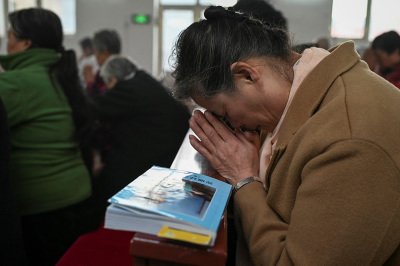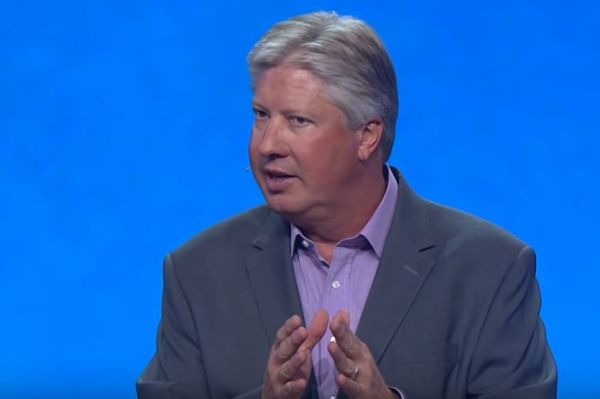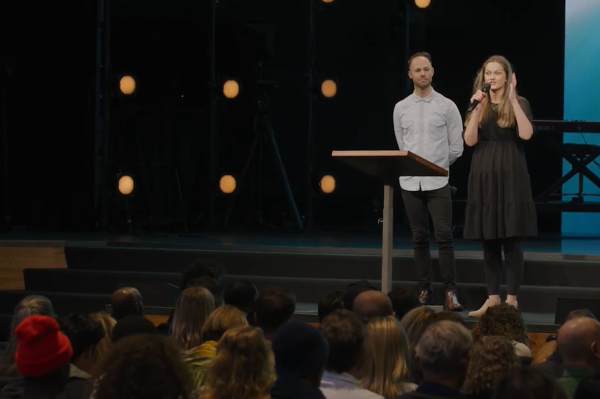What does 'God is good, God is great' really mean?

“God is good, God is great,” we say in a childhood prayer. Cute words, but what do they actually mean? And what do they mean for us today?
“God Almighty” in Scripture is translated from the Hebrew words “El Shaddai.” What gets lost in translation is that this literally means the God who is “all-sufficient” or the “God who is enough.”
During a pandemic — with job losses, health crises, shortages, and difficulties at every turn — these words mean that people who know God can put their trust in God’s greatness because God is great.
Today, as from the start, God is our “El Shaddai.” In Genesis Chapter 17, God changed Abram’s name to Abraham in order to change his identity to become a father of nations. For the same reason, he changed Abraham’s wife’s name from Sarai, which means “survive,” to Sarah, which means “princess,” or “mother of nations” (Genesis 17). With the name change came a change in depending on self and self-sufficiency to depending on God and his all-sufficiency.
From Bible days to today, God has always been completely sufficient. He is Almighty. He is all-powerful. His capabilities and capacity are without precedent and without end. He is never diminished. God is never tired, drained, overwhelmed or depleted in any way. Nothing is too hard for God. Nothing is impossible with “El Shaddai,” our God Almighty.
God is all-sufficient and He is our sufficiency. So, if He is sufficient for the struggles we may face today, how do we get more of that sufficiency in our lives? And if he’s our sufficiency, why would we ever live on the level of insufficiency? I’ll give you four reasons.
First, people tend to look at what we have instead of what God has. When Jesus told the disciples to feed a crowd of 5,000, Philip said they didn’t have bread “sufficient” for the size of the crowd. But Jesus blessed what they did have and the crowd was fed, with 12 baskets left over.
We often fail to see God’s greatness in our lives because, like Philip, we allow our own insufficiencies to define us. That’s not to say we should feel sufficient in ourselves. Knowing we’re insufficient is the very thing that pushes us to depend on God. When we do, the greatness of our “El Shaddai” defines us, not our insufficiencies.
Sensing his insufficiency, a rich young ruler asked Jesus, “What do I lack?” Jesus told him to sell all and follow Him. The story illustrates that we must choose Jesus over possessions and that we cannot rely on possessions. The rich young ruler became sad. He didn’t realize when he was asked to give things up that He was talking to someone who had access to everything.
Like the rich young ruler, we can get hung up on what we have and who we are instead of trusting what God has and what God can do.
Second, we often don’t ask. We “have not because we ask not,” the Scripture states (James 4:2).
Americans have left $3 billion in gift cards unspent, uncashed, and unutilized. That’s an astonishing waste. Kind-hearted people spent $3 billion on gifts they thought would bless or help another person, and the person receiving the gift just never used it.
Jesus paid the price with his life to connect us to the Father, the “El Shaddai,” so that in our insufficiency, we would have sufficiency. We should make use of what He gave us.
We serve an amazing God. Don’t be afraid to ask.
Third, we fail to expand our capacity to receive. How do we expand? Through generosity. When Jesus fed 5,000 people, he used a little boy’s loaves and fish. That boy’s gift of everything he had prepared the way for miraculous multiplication.
I like the way the Message Bible translates the principle. “The world of the generous gets larger and larger the world of the stingy gets smaller and smaller” (Proverbs 11:24 MSG).
God is not against people being wealthy. He is against people being stingy. Generosity starts with the small bit you have now in your hand. Jesus states that whoever can be trusted with very little can also be trusted with much. And whoever is dishonest with very little will also be dishonest with much (Luke 16:10).
Living a generous lifestyle expands you. And when you’re expanded, there’s simply more room for God to pour in His “El Shaddai” greatness.
Fourth, we live with the wrong mindset. Some of us come from families, situations, communities, and nations that are steeped in a poverty mindset. By breaking the poverty mindset, our “El Shaddai,” the Father of eternity who owns everything, will bless us with what we need.
At times, we think small. We think God is not able to bless. We develop an orphan mindset. We feel abandoned by our Heavenly Father. Some people even live with a slave mindset. God wants us to break that off.
We’re each living the most exciting life in the entire world because we’re following the Master, the “El Shaddai,” the all-powerful ruler and king. We all have today what the rich young ruler passed up. We have what he couldn’t fathom. We’re living through a pandemic, sure, and yet we’re living through it with the all-sufficient God.
It’s time to focus on what God has in His hands, not on what is in your hand. Ask God for every small thing you need. Don’t be afraid to name it. Let go of some of what you have, and live generously in order to move into what God has for your life. And get into God’s Word so your mind can let go of a poverty mindset and embrace God’s abundance, God’s power, and God’s strength. There is no lack in our God who is all-sufficient.
The truth has never changed. God is good. And God is great.
Dr. William M. Wilson is the president of Oral Roberts University (ORU) in Tulsa, Oklahoma. Dr. Wilson is instrumental in developing Spirit-empowered leaders through whole person education to impact the world. He is known as a global influencer and a dynamic speaker with four decades of executive leadership experience. Wilson’s weekly television program, “World Impact with Dr. Billy Wilson” has been inspiring viewers in over 150 nations and multiple languages since 1998.
As Global Co-chair of Empowered21, which attracts Spirit-empowered principals from ministry, academics, and next-generation voices. Wilson is the Chair of the historic Pentecostal World Fellowship and holds leadership positions with the National Association of Evangelicals, Mission America Coalition, International Christian Embassy Jerusalem, American Association of Presidents of Independent Colleges and Universities, and the City of Tulsa Chamber of Commerce.





















